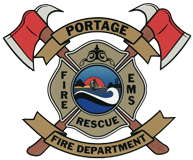Patrick Newell, BA-Psychology, EMT-P, Lieutenant at the Portage Fire Department
“I am my Brother’s keeper.” It is a long-used term throughout the fire service, meaning
that we watch over our own. Now, more than ever, this term is more important.
As time has gone by, many, if not most, of our Old Guard brothers and mentors
have retired, moved on, or unfortunately passed away. The younger generations are
built different, wired in different ways, accepting of new concepts and open minded in
ways the older generations were not. If you have been in the service longer than 15
years, you’ve no doubt heard “just suck it up” more than once. In the fire, EMS, and
police services, we see more death and dismemberment, blood and gore, and generally
unsettling that many humans are not meant to witness. Yet we return to work the next
shift, expected by Joe Q. Public to get back on that horse and ride to the rescue once
again. And we do, shift after shift, burying those memories, ignoring those sights,
sounds, and smells. Because this is the profession we have chosen, for one reason or
another.
However, we are now seeing the toll that “suck it up” is and has taken on our
brothers and sisters. Statistics are coming out, investigations being made, and results
tabulating. More of us leave the service early, whether be retirement or just plain
quitting, due to the things we encounter. Worse yet, suicide is becoming a top killer of
our profession. The generations of keeping quiet and ignoring the problem are hurting
our industry in every way. Nationwide, departments are facing lower application rates,
and paramedic programs are seeing less enrollment and completion. The younger
generations are not willing to be apart of the worst things we have seen. A lot of the
older members see this as them being weak, or soft, but maybe they subconsciously
recognize the perils of the profession. Worse, maybe they have already been impacted
by such things.
So, we have briefly covered the past, so now it is time to dig into the present and
future of it. That future is Peer Response and Counseling. These peer groups are
coming in the forms of Critical Stress Incident Management/Debriefing, Peer Response
teams, Employee Assistance Programs, and more, just to name a few. These groups
are and can be founded by department administration, government entities, groups of
psychologists and/or clinicians, and even your own brothers and sisters. These groups
are forming in greater numbers every day, and that is the encouragement our industry
sorely needs. A peer support group is an easy one to form at your department, because
all you need are brothers and sisters who care and a solid entity to refer them out to for
added and clinical assistance.
A solid peer response group should hopefully consist of members of your
industry, whether be fire, police, EMS, or any combination of them all who can respond
when needed. These are people who are able and willing to meet with an individual or
shift when the need arises. A good peer response team is valuable because it is led by
folks in your industry who know what your job entails, what you see every day, and who
can relate to your experiences. Often times, individuals avoid such therapeutic
interactions because they don’t believe that the person they are speaking to has any
relation to their event, and just doesn’t understand. Sometimes, this is correct.
Sometimes, the need for a higher level of counseling or therapy is needed beyond a
peer interaction to help overcome what they have experienced once they have talked it
out with a peer. Many times, simply taking about the experience is helpful.
The need for peer response is a vital component to any department of any kind.
It’s free, it’s accessible, and it’s helpful at the onset of the incident as well as post
incident in days and weeks ahead. A peer should not, under any circumstances, try to
give advice on any level, because that is not what we are needed for. What works for
one person does not necessarily work for another, and that experience tends to push
others away. Additionally, all group gatherings should be treated as confidential,
because just because a group of responders experienced the same incident, doesn’t
mean they experienced it in the same way. Spreading information on what others saw
or felt and what their mindset is does not garner respect or trust, and those two things
are vital to the success of a good peer response team.
If possible, set up a solid training for your peer response team. The IAFF has a
program for peer response and gives an insight as to what is involved and how to
manage these situations. Form groups from around your area in various levels of
Emergency response. More participants mean more opportunity to respond when
needed and not put off the interventions longer than is helpful.
“I am my Brother’s Keeper” is more important now than ever before, and it means
the same now as it did then, but in different ways. Black Wednesdays, a term used for
crews to get together after a shift and going to a bar to drink and laugh and talk was
useful and beneficial in some ways, back then. Now, it is recognized to promote
destructive behavior, encourage addictions, and overshadows true healing. So, we
replace those days with peer response groups, which accomplish the same thing
without the negative side effects. Remember to promote yourselves and your group to
your members. If you can reach one member, the success of your team will grow as
they spread their experiences. Hopefully, we can once again see our numbers grow and
careers extend by recognizing the ugly little monster under our beds.
Take care of yourselves, and each other.
